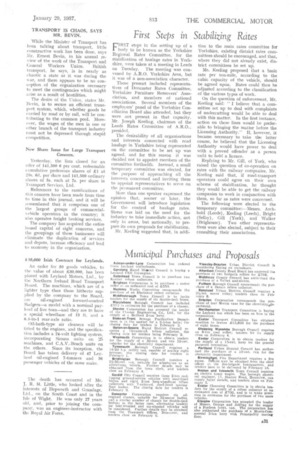First Steps in Stabilizing Rates FF IRST steps in the setting
Page 33

If you've noticed an error in this article please click here to report it so we can fix it.
up of a body to be known as the Yorkshire Regional Rates Committee, for the stabilization of haulage rates in Yorkshire, were taken at a meeting in Leeds on Tuesday. The meeting was convened by A.R.O. Yorkshire Area, but it was of a non-association character.
Those present included representh, fives of Doncaster Rates Committee, Yorkshire Furniture Removers' Association, and members of national associations, Several members of the employers' panel of the Yorkshire Conciliation Board also attended, but they were not present in that capacity. Mr. Joseph Keeling, chairman of the Leeds Rates Committee of A.R.O., presided.
The desirability of all organizations and interests connected with road haulage in Yorkshire being represented on the committee to be set up was agreed, and for this reason it was decided not to appoint members of the committee forthwith. Instead, a small temporary committee was elected, for the purpose of approaching all the interests concerned and inviting them to appoint representatives to serve on the permanent committee.
More than one speaker expressed the opinion that, sooner or later, the Government will introduce legislation for the control of haulage rates. Stress was laid on the need for the industry to take immediate action, not only in areas, but nationally, to prepare its own proposals for stabilization.
Mr. Keeling suggested that, in addi tion to the main rates committee for Yorkshire, existing district rates committees should be encouraged, and that, where they did not already exist, district committees he set up, Mr. Keeling proposed that a basic rate per ton-mile, according to the cubic capacity of the vehicle, should be agreed upon. Rates could then be adjusted according to the classification of the various types of work.
On the question of enforcement, Mr. Keeling said: "I believe that a committee set up to deal with complaints of undercutting would be able to deal with this matter. In the first instance, action on these lines would be preferable to bringing the matter before the Licensing Authority." If, however, it became necessary to take the latter course, he believed that the Licensing Authority would have power to deal with a proved offender as a person unfit to hold a licence.
Replying to Mr. Gill, of York, who raised the question of co-operation on rates with the railway companies, Mr. Keeling said that, if road-transport operators could agree on their own scheme of stabilization, he thought they would be able to get the railway companies to work in conjunction with them, so far as rates were concerned.
The following were elected to the temporary committee:—Messrs. Archbold (Leeds), Keeling (Leeds), Bright (Selby), Gill (York), and Walker (Brighouse). Two other representatives were also elected, subject to their consulting their associations,




















































































